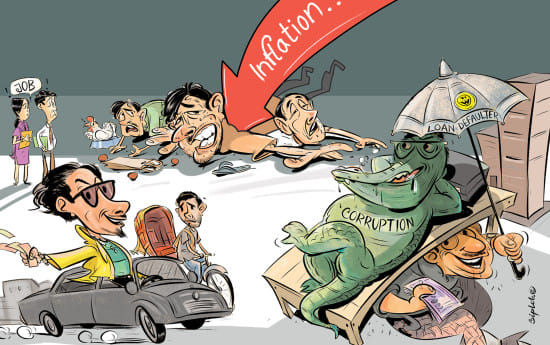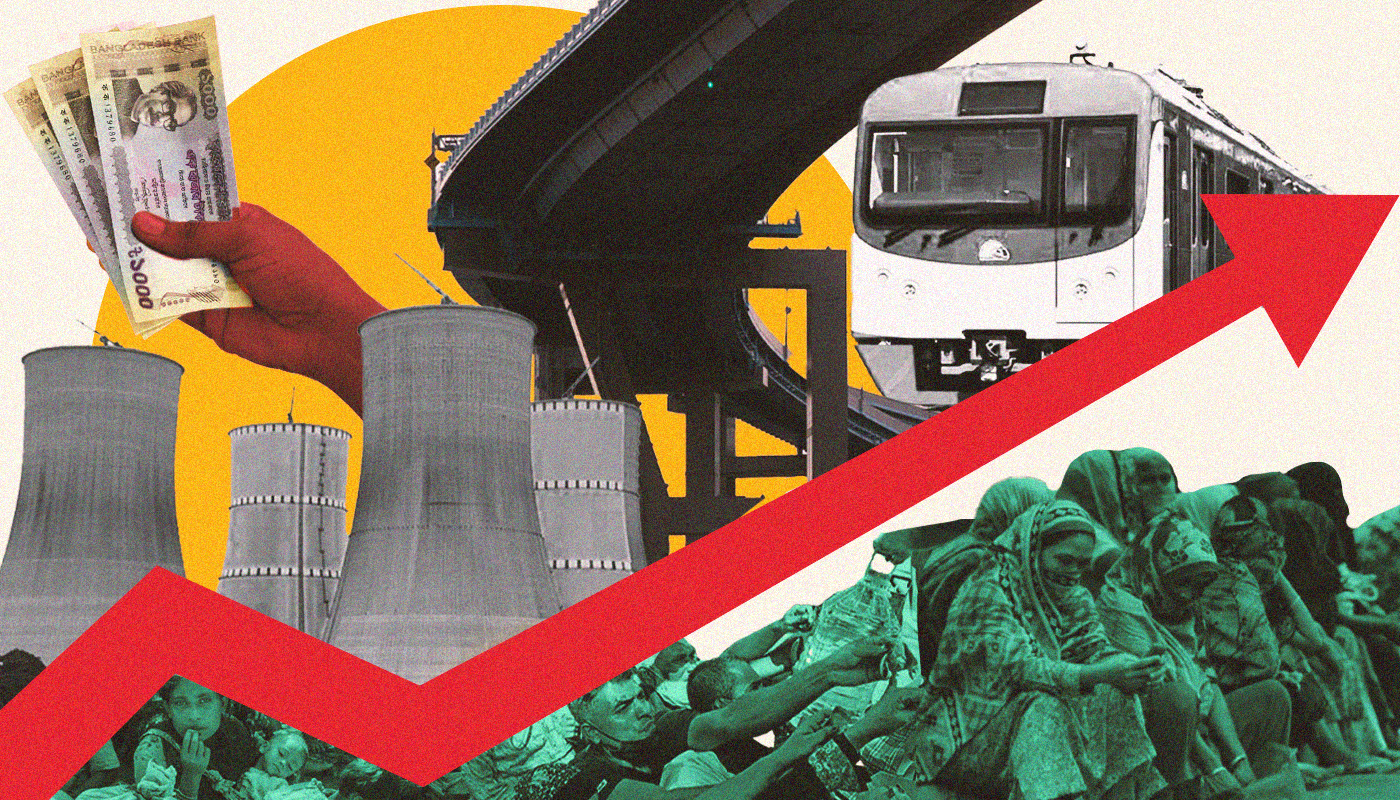We need humility, not hubris, to turn the economy around

The economy appears to be at a crossroads. For a variety of reasons, the general optimism people had about it in pre-pandemic times has been replaced with apprehensions. And while a privileged minority, sitting in their high castles, continue to enjoy a larger and larger share of the fruits of "development," it is becoming obvious that the vast majority are increasingly struggling.
On a national scale, what is worrying is that economic growth itself is slowing down. On April 2, the World Bank revealed that it projects Bangladesh's real GDP growth to remain relatively subdued at 5.6 percent in the current fiscal year and at 5.7 percent in the following year, lower than the average annual growth rate of 6.6 percent over the decade preceding the Covid-19 pandemic. Similarly, the IMF, for a second time, revised down Bangladesh's growth forecast for the current fiscal year to 5.7 percent in its World Economic Outlook report released on April 16.
On May 20, the Bangladesh Bureau of Statistics (BBS) released its periodic data. According to its projection, the economy grew by 5.82 percent in the outgoing financial year, which is far less than the initial projection of 7.5 percent made in the budget speech for FY24 and the revised projection of 6.54 percent made in a meeting of the coordination council in December—but is much closer to the projections made by the World Bank and IMF.
This raises a very critical question: why were the government's projections so far off? If the World Bank and IMF could come up with relatively accurate estimates, why couldn't it? Given that government officials often outright refuse to accept data presented by reputed organisations—without presenting their own evidence to counter it—it is perhaps time for the authorities to get down from their high horses, particularly in light of their own poor record of coming up with correct estimates.
Be that as it may, some economists have even questioned the BBS projection of 5.82 percent GDP growth. And they have done so based on the fact that there is "no positive indicator" right now that can explain it—which just about sums up how the economy is currently doing.
For example, even though BBS data shows the agriculture sector this year recorded a growth similar to last year, the industry sector, which accounted for more than one-third of the country's GDP, grew at 6.6 percent in FY24 compared to 8.37 percent in FY23. And a large part of that had to do with the import of industrial raw materials and machinery being affected by the dollar crisis, and energy price hikes having substantially increased industrial production costs for businesses.
Unfortunately, there wasn't much the government could do in that regard, as it had to take certain policy measures to try to rein in inflation which, on the flipside, was bound to negatively affect growth. However, as a Centre for Policy Dialogue survey in partnership with the World Economic Forum (WEF) found, 67.6 percent of respondents complained about high levels of corruption as another major problematic factor for doing business. So, the government should have given more emphasis to try and reduce corruption, which could automatically provide businesses with a huge boost by improving our business environment—and perhaps encourage more businesses to set up.
Meanwhile, persistent inflation has been weighing on private consumption growth, and combined with rising interest rates and financial sector vulnerabilities, the World Bank expects investor sentiment in Bangladesh to dampen. Consequently, it believes that an efficient resolution framework for non-performing loans (NPLs) is urgently needed. However, since most of our banking sector issues are somehow tied up with political considerations, the government till now has shown no sign of mustering up the political will or courage to actually address them.
Private investment growth slowing has become a regional problem, according to another World Bank report. And so is the fact that South Asia as a whole is not creating enough jobs to keep up with its rapidly increasing working-age population. For Bangladesh, this has become a particularly acute problem and, as a result, the country is failing to make the most of its demographic dividend.
On the other hand, even among those who have jobs, the majority are seeing their wage growth being significantly lower than the inflation rate for more than two years. In fact, according to BBS figures, wage growth remained below the inflation rate for the 26th consecutive month in March.
The combination of these factors has prompted some to ask whether Bangladesh is entering a period of stagflation—a phenomenon that combines slow growth, high unemployment and inflation. But that does seem a bit premature, as the economy is still growing, albeit at a slower rate, and unemployment is still not exceedingly high—even though the official unemployment figures are clearly too good to be true.
However, the cost-of-living crisis is a serious problem which is drastically reducing the standard of living for most people. The erosion of purchasing power has already led to around five lakh people falling into extreme poverty between FY2022-23 and FY2023-24, according to the World Bank. And unless things turn around quickly—which does not look very likely—poverty will continue to rise and people's disposable income will continue to fall.
Amidst all these, BBS data shows per capita income increasing slightly from last year to $2,784 in the current fiscal year. Does that mean Bangladeshis are now economically better off? Absolutely not. Per capita income is obviously getting skewed by the ultra-rich—acting as outliers. And as media reports have shown, many of them happen to be the ones who are now running—or occupying—government offices at different levels.
With their wealth surging, most policymakers and politicians have become oblivious to the current economic sufferings of the mass people, which is another reason why its policies have been so insufficient at addressing the crisis. In fact, many government policies nowadays are no longer formulated with the aim of easing the ongoing crisis, but to continue filling the pockets of vested interests, at the expense of the majority and the country's economy as a whole.
In other words, the rich and the powerful are in the process of slowly killing the golden goose that they have/are benefitting from. As that continues, two things could happen simultaneously: i) social unrest could grow alongside the sufferings of mass people; and ii) the share of the benefits that the oligarchs fight over could decrease, leading to more infighting. Since both these factors could destabilise the economy further, one could only hope that common sense (in the oligarch's self-interest even) prevails before we get to that dangerous tipping point—but how wise is it to expect humility, from where there has only been hubris?
Eresh Omar Jamal is deputy head of editorial and opinion at The Daily Star. His X handle is: @EreshOmarJamal
Views expressed in this article are the author's own.
Follow The Daily Star Opinion on Facebook for the latest opinions, commentaries and analyses by experts and professionals. To contribute your article or letter to The Daily Star Opinion, see our guidelines for submission.




 For all latest news, follow The Daily Star's Google News channel.
For all latest news, follow The Daily Star's Google News channel. 

Comments